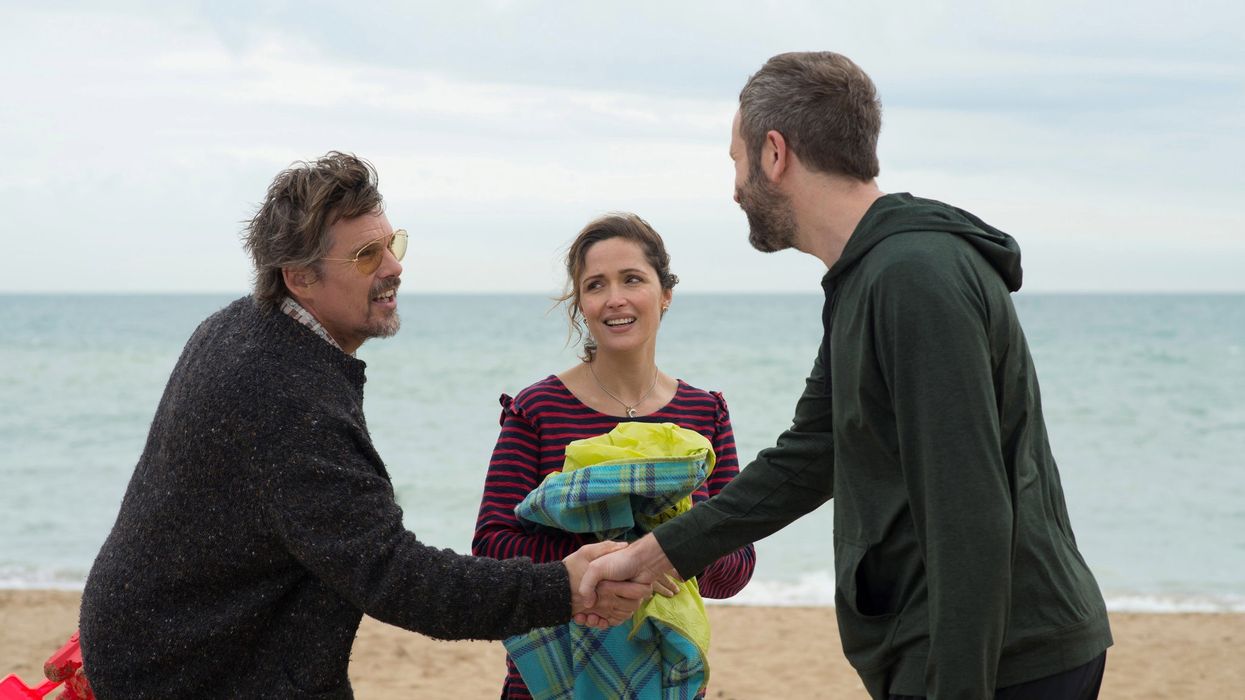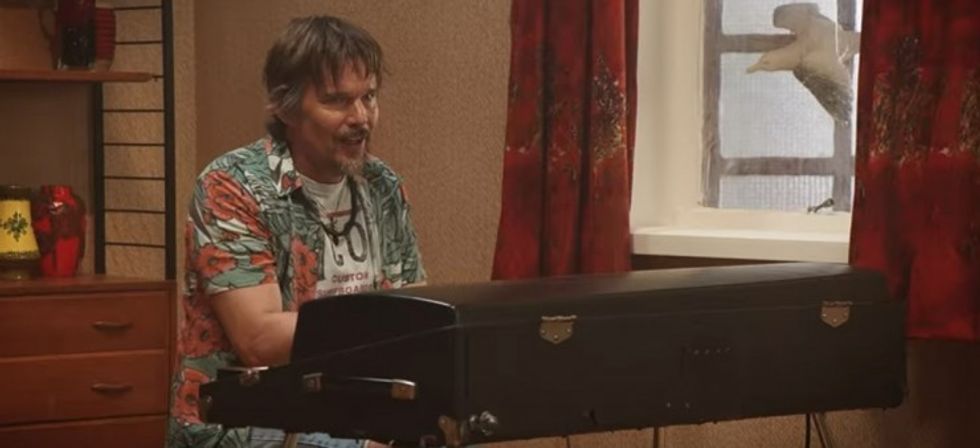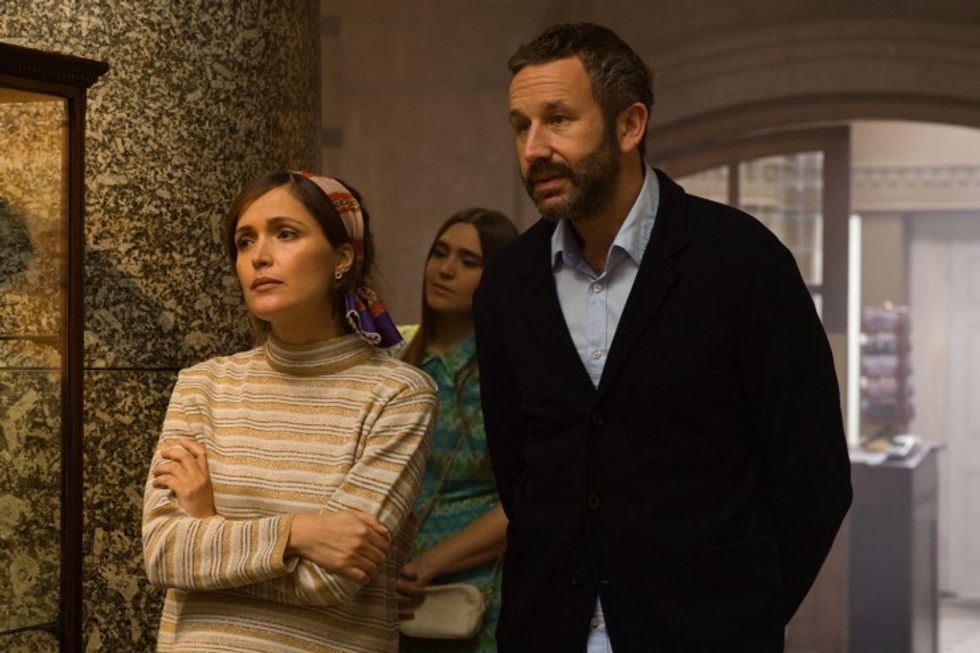'Juliet, Naked': How Adapting a Famous Novel was Like Solving a Puzzle for Its Screenwriter
For screenwriter Evgenia Peretz, one of the most challenging things about adapting Nick Hornby's 'Juliet, Naked' was working on character backstories.

To adapt Nick Hornby's novel, Juliet, Naked, for the screen, director Jesse Peretz and screenwriter Evgenia Peretz took a very dense, complex narrative and transformed it into a genial and entertaining film.
The performances are evenly skilled: Rose Byrne is relaxed as Annie, a director of a small museum in a British seaside town. Her character lives with Duncan, a somewhat less relaxed academic (played with believable angst by Chris O'Dowd), whose greatest love is the website he has built around Tucker Crowe (Ethan Hawke), a rocker who has lived out of the limelight for nearly two decades. When Duncan receives an unreleased album by Crowe in the mail, Annie listens to it after accidentally opening the package.
When Annie posts an angry review on Duncan's site, Crowe himself responds, and a strange friendship begins. Hawke wears the role comfortably and also reaches outside of it; Crowe's interactions with Annie and Duncan are charged, as facial expressions and silences communicate as much as the excellent dialogue.
No Film School spoke with Evgenia Peretz (also the screenwriter of Our Idiot Brother as well as a noted journalist) about the adaptation process.
No Film School: I noticed there were three screenwriters listed. I was very curious how all of you collaborated and divided duties.
Evgenia Peretz: So, Jim Taylor and Tamara Jenkins are a married couple. They did a first draft of it before I ever got involved, probably two or three years ago. There were some parts that were really wonderful and some other things that Jesse and I really wanted to bring out from the book and sort of invent cinematically.
NFS: The book itself is very unique, in that it gives you a tremendous amount of information about its characters, more than some books might. It's very much inside their minds. When you were working on the screenplay, how did you cull all of this information?
Peretz: I think one of the really challenging things about this book is Tucker and Annie and the way they meet by email. In the book, there are really, really long chunks of email correspondence. Part of it is explaining who they are and that comes with a ton of backstory.
That works really well in a novel, because anything goes stylistically—you can pull it off. The challenge was conveying all that information without being incredibly slow. You want the story to move forward, you want there to be something visually to look at, so it was a real puzzle trying to convey all we needed to convey about these characters and also keep the story going at an enjoyable pace.
Up until the very end, we were working on the voiceover, both at the beginning of the movie when she's giving a bit of her backstory, and their email correspondence. In a certain way, it was a challenge to have so much done in voice-over, but it also gave us the liberty to change it up until the last minute, because that just meant re-recording sessions.
The characters don't meet until halfway through, so we were really struggling to figure out how to get these people to really connect in the first half of the movie before they've ever met.
"It was a real puzzle trying to convey all we needed to convey about these characters and also keep the story going at an enjoyable pace."
NFS: What percentage of the original book would you say stayed in the screenplay and subsequently what did you produce to glue those parts together?
Peretz: Nick Hornby's dialogue is so funny that in many of the really amazing scenes, we had such great, raw material to work with. The scene in the hospital, for instance, went on for a very long time in the book, so in cases like that, you're just pulling out the lines that you think are the funniest and the moments you think are the most important. You're trying to shape it into a scene that isn't 20 pages long.
There were also some themes that weren't quite in the book that Jesse and I both wanted to pull out and really emphasize. In some ways, that involved some condensing. In the book, Annie doesn't really have much of a backstory about why is she living in this town. She just kind of moves there and never leaves. I thought it was important to create a little bit more of a backstory about how she was connected to this town.
There was this trans character named Ros; we sort of created a sister character based on her and created this backstory of Annie’s dad having died, and the museum that she took over from him, and her sister being a little bit of a mess, so she always felt like she needed to be there for her.
I think we intensified Tucker's backstory a little bit, in relation to the kid he left behind. In the book, he had heard about a baby that was born and he didn't care. We wanted to heighten that drama a little bit, so that his transgression would be really awful and might explain why he became so full of self-loathing and disappeared from the scene.
I think the last final thing that we added was how Tucker comes around at the end and is there for his daughter Lizzie, once she's been ditched by the father of her child. We wanted to show that he really is genuinely learning to care about his family members. For that, we took major departures.
NFS: One question that I also have that relates to what you just said is about the function of empathy. When Tucker and Annie are becoming closer, one part of me thought, "That's terrific, what a nice storyline), but then another part of me felt like when I was watching a horror film, saying, "Don't go in the house.” I was curious what it was like to write characters like this, walking a line between likability and unlikability.
Peretz: I think for us, probably one of the biggest questions that we had in mind throughout the whole process—writing the script, and shooting, and evenafterwards—was if Tucker was going to be worthy of Annie's love. Especially in this day and age, with a roguish, rascally guy who has lived irresponsibly and has all these kids, it reads oddly if he gets by on his charm because he's so irresistible.
That was a real struggle for us, and Ethan contributed so much to this. How do you make that character really feel soulful and considerate of other people? How do you root for these characters to get together? I think Ethan also felt very comfortable with his character; he knew he could make him someone Annie would like but wouldn’t go so far as to say, "Yes, I want to be the mom to all his kids.”
NFS: To what extent did the actors shape the screenplay? Did the screenplay change when you were working with them on the film?
Peretz: I would say that Ethan probably had the biggest input in terms of his character; and I think he was the one who initially flagged this idea of having something more dramatically horrible that he did in his past. I think that was really important and added a lot. I think he felt pretty confident making him not a perfect person, a little bit of a devil, but getting to that place where you say, "We still like him!"
NFS: There's definitely a real complexity to these characters. Duncan's a very complex character, and as unlikable as he is in certain parts of the film, he's also fairly sympathetic at other points.
Peretz: I should say that even though Chris was hysterical, he also approached every scene in a very serious way, in that he really wanted to understand his motivations. He looked very carefully at the pages every day.
NFS: If you could say you learned something about Nick Hornby as a writer by working on this film, what would that be?
Peretz: I've always loved his books, obviously some of his movie adaptations of his books are fantastic, and there's a lot to live up to there. I think he has a real affection for his characters. He’ll want to watch everyone, even when they're being idiots or making fools of themselves. He doesn't see anyone as a caricature; there is a warmth and a humanity.
He also has a great sense of plot and story, and obviously humor and wit. I feel like that combination of those things, to me, is very much my personal sensibility and what I want to achieve in my writing.
For more information on 'Juliet, Naked,' click here.













